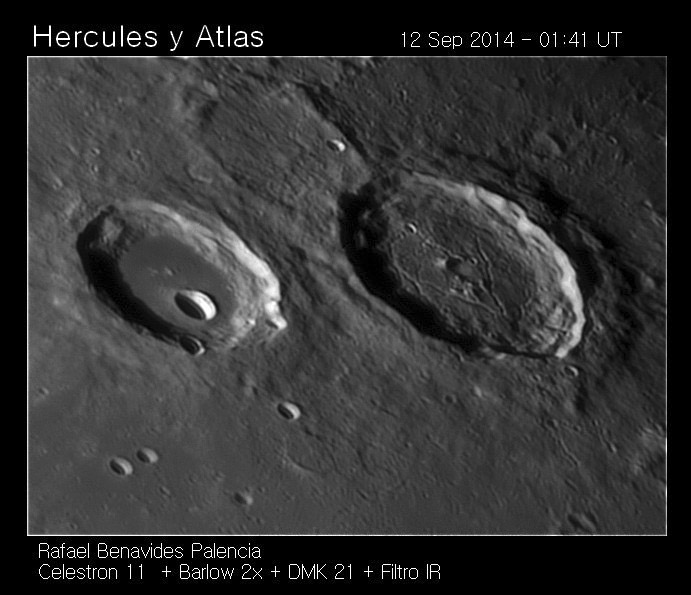Difference between revisions of "September 13, 2014"
| Line 18: | Line 18: | ||
<p><b>Tomorrow's LPOD:</b> [[September 14, 2014|We Never Went To the Moon?]] </p> | <p><b>Tomorrow's LPOD:</b> [[September 14, 2014|We Never Went To the Moon?]] </p> | ||
<hr /> | <hr /> | ||
| + | {{wiki/ArticleFooter}} | ||
Revision as of 17:45, 7 February 2015
Two Manifestations of Volcanism

image by Rafael Benavides, Córdoba, Spain
Two of my favorite Greek heroes are back in LPOD's spotlight. Compared to two earlier, higher Sun views we can't see the darkness of pyroclastic deposits around the volcanic pit at the bottom of Atlas' southern wall, but we see more of the subtle topographic details of the floor, rim and ejecta. The lava-covered floor of Hercules continues to look featureless except for two small peaks barely sticking above the lava, and the bright Hercules G crater. With the LRO QuickMap altimetry tool we learn that the floor of Atlas slopes downward as much as 1000 m from the west to east sides. But altimetry shows the floor of Hercules is very flat with no tilt. Why the difference? Hercules' floor was formed from the solidification of a giant lake of molten lava that followed the Moon's geopotential surface. Atlas' floor was uplifted by intrusions of lava from below, causing the fracturing, pyroclastic eruptions and topographic irregularities. Apparently the lift was greater on one side than the other.
Chuck Wood
Technical Details
Celestron 11 + Barlow 2x + IR Pass Filter + and DMK 21 camera. Processed with Registax 4.1.
Related Links
21st Century Atlas chart 9.
Yesterday's LPOD: A Mare with Benefits
Tomorrow's LPOD: We Never Went To the Moon?
COMMENTS?
Register, Log in, and join in the comments.



